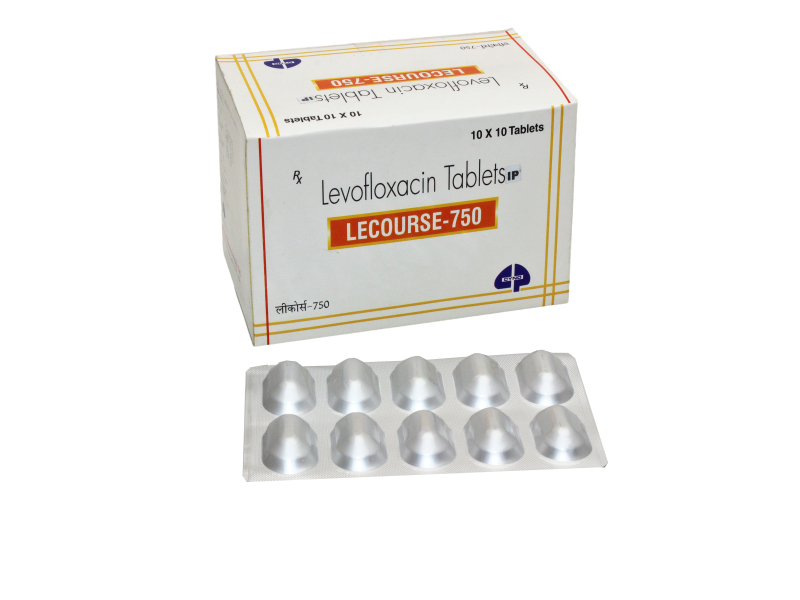LECOURSE-750
Levofloxacin (750 mg)
Lecourse 750mg Tablet is an antibiotic, used in the treatment of bacterial infections. It is also used in treating infections of the urinary tract, nose, throat, skin, soft tissues and lungs (pneumonia). It cures the infection by stopping the further growth of the causative microorganisms.
Levofloxacin is used to treat a wide variety of bacterial infections. This drug belongs to a class of quinolone antibiotics. It works by stopping the growth of bacteria. This antibiotic only treats bacterial infections.

Mechanism of Action
Levofloxacin is a broad-spectrum antibacterial agent. This enzyme acts by inhibiting DNA gyrase and topoisomerase four. DNA gyrase creates a highly condensed structure of DNA that is a three-dimensional structure. By its nicking and closing activity and introducing negative supercoils to the DNA double helix. Doing levofloxacin inhibits DNA gyrase resulting in an abnormal association between open DNA and gyrase and impaired negative supercoiling. It inhibits the transcription of DNA in RNA and later protein synthesis.
Half-Life
6 – 8 hour
Indications
1.Sinusitis 2.Bronchitis 3.Pneumonia 4.Urinary tract infection 5.Traveler`s diarrhea 6. Skin and soft tissue infections
Pharmacokinetic Properties:
Absorption: It is rapidly and completely absorbed after oral administration. Distribution: It is widely distributed in the body. Metabolism: It undergoes a fatal metabolism in the liver. Excretion: The drug is excreted mainly through urine.
Drug-Drug interactions:
Drug interactions of this tablet include products that include iron, calcium, zinc, or magnesium; Sucralfate, Dedanosine, nonsteroidal anti-inflammatory drugs (NSAIDs), and warfarin. It is not recommended for use in pregnant women because it causes joint and bone deformities in juvenile animals of many species. It is excreted in breast milk. Mothers should decide whether to stop breastfeeding or discontinue lecourse 750mg.
Precautions:
1.Hepatic impairment 2.Renal impairment 3.Epilepsy 4.Cerebral arteriosclerosis 5. Caution while driving the vehicle or operating machine or involved in any hazardous activities. 6. Avoid exposure to sunlight 7. CNS disease
Fertility:
Levofloxacin is an antibiotic that has a histopathology effect on sperm cells, especially in high doses. Therefore, it may reduce fertility in the male which needs further study. One of the main problems in today’s medical world is infertility effects.
Dosage:
Adult: The dose is determined based on the severity of infection, the patient’s infection type, age, weight, and kidney function. Sinusitis, bronchitis, pneumonia, skin and soft tissue infections: 500 mg daily for 1 – 2 weeks
Duration of action:
Levofloxacin pharmacokinetics are linear and predictable after single and multiple oral or iv. After a daily dose of 500 mg or 750 mg, the steady-state is reached within 48 hours.
Adverse Reaction:
1. Nausea 2. Vomiting 3. Diarrhea 4. Abdominal discomfort 5. Restlessness 6. Dizziness 7. Drowsiness 8. Arthralgia 9. Rash 10. Confusion 11. Insomnia 12. Anorexia 13. Bad taste 14. Headache 15. Photosensitivity.
Storage:
Store at 25 – 30 degree C in a tightly closed container.
Overdosage:
Give supportive measures and symptomatic treatment. Empty the stomach. Maintain appropriate hydration.
Contraindications:
Hypersensitivity to Levofloxacin and other Fluoroquinolones
Warnings:
Both oral and injectable fluoroquinolones are associated with side effects affecting the tendons, muscles, joints, nerves, and the central nervous system.
Fluoroquinolone is associated with inefficient and potentially irreversible serious adverse reactions that have occurred simultaneously: tendinitis and tendon rupture, peripheral neuropathy, and CNS effects
Discontinue the drug immediately and avoid the use of systemic fluoroquinolones in patients who experience any of these serious adverse reactions.
These side effects can range from a few hours to weeks after exposure to fluoroquinolones and may be permanent.
Pregnancy
Contraindicated
Breast Feeding: Contraindicated
The use of levofloxacin is acceptable in nursing mothers with infant monitoring for possible effects on the gastrointestinal flora, such as diarrhea or candidiasis (thrush, diaper rash). Breastfeeding should be avoided for 4 to 6 hours after a dose, which may reduce the infant’s exposure to levofloxacin.
Old Age
Use with caution
Children
Contraindicated
